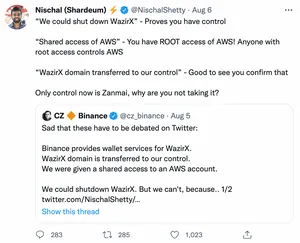Their announcement began by saying, "We would like to inform you about an important development that does not affect our services, funds or investments with Nuri," and throughout the post they stressed that customer funds were safe.
Nuri blamed the insolvency on everything from "the ongoing after-effects of the Corona pandemic" to "the economic and political uncertainties in the markets after Russia's invasion of Ukraine" to the more recent crypto bear market.
On October 18, the company announced they would be shutting down after failing to find someone to acquire the company. They asked customers to withdraw their funds by December 18. Unlike many of the services that faced insolvency crises this summer, Nuri is closing without any loss of customer funds.







































![Correspondences of my email sent to support on 15 Jun 2022: To: support@celsius.network Cc: ceo@celsius.network Dear Alex and Celcius support, I am writing this email to ask for your special consideration to allow me to make a small withdrawal on my BTC held in Celcius. I understand that Celsius made the decision to pause withdrawals in a volatile market condition, but do hope that you review my case and give me special permission. I am 5.5 months pregnant with my third child. I am expecting to give birth in early October and I do need the fund to pay for the hospital, doctor and baby items such as cot, clothes, nappies etc. I also need the fund to pay for school fees for my two other schools aged children. I have attached a recent scan of my baby and a letter from my obstetrician confirming my pregnancy and planning for admission into the hospital. Scan of my baby that am carrying: [ultrasound photo of a fetus]](https://primary-cdn.web3isgoinggreat.com/entryImages/resized/celsius-doc104_300.webp)



